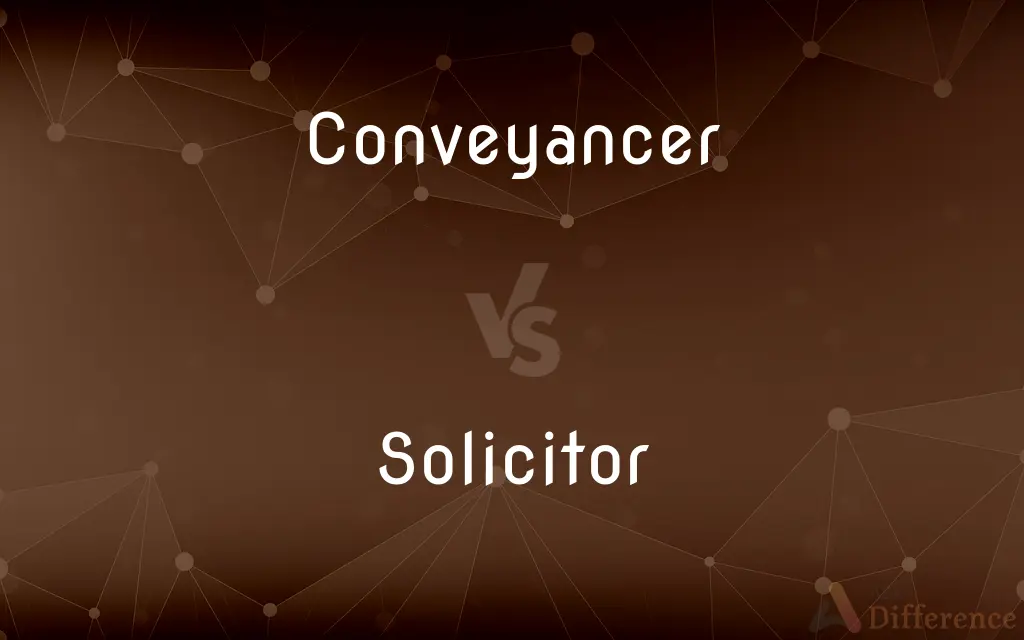Conveyancer vs. Solicitor — What's the Difference?
Edited by Tayyaba Rehman — By Maham Liaqat — Published on April 11, 2024
A conveyancer specializes in property law, handling legal aspects of buying and selling property. A solicitor is a broader legal professional who can offer a range of legal services, including conveyancing.

Difference Between Conveyancer and Solicitor
Table of Contents
ADVERTISEMENT
Key Differences
A conveyancer is a legal professional who specializes in the legal aspects of buying and selling real property, such as homes or land. They focus on transferring the legal title of property from one person to another and dealing with the various legal aspects that entail. On the other hand, a solicitor is a more broadly qualified legal professional who can provide a wide range of legal services, including conveyancing, but also family law, criminal law, and more.
While conveyancers are specialized in property law and may offer a more focused service in this area, solicitors have the advantage of providing more comprehensive legal advice that may be necessary if the property transaction involves more complex legal issues, such as disputes or litigation. This broader expertise means that solicitors can handle a variety of legal problems that might arise during the conveyancing process.
Conveyancers are typically chosen for straightforward property transactions due to their specialized knowledge and often lower costs compared to solicitors. However, if a property transaction is complicated by legal issues outside of standard conveyancing, a solicitor's broader legal knowledge and qualifications can be invaluable, making them a better choice in such situations.
The qualifications required to become a conveyancer versus a solicitor also differ. In many jurisdictions, conveyancers may not need a law degree and can qualify through specific conveyancing qualifications and practical experience. Solicitors, on the other hand, are required to have a law degree and further legal training, making them qualified to practice in various areas of law.
In terms of services provided, conveyancers handle tasks such as conducting local council searches, dealing with the land registry, and preparing the sale contract. Solicitors can perform all these tasks but can also offer legal advice on issues that might affect the property transaction, such as tax implications, inheritance issues, and more complex contractual matters.
ADVERTISEMENT
Comparison Chart
Specialization
Property law, specifically conveyancing
Broad legal services, including conveyancing
Advantages
Specialized knowledge in property transactions
Can handle complex legal issues beyond conveyancing
Qualifications
Specific conveyancing qualifications
Law degree and further legal training
Cost
Often lower than solicitors
Generally higher, reflecting broader expertise
Services
Property searches, land registry, sale contracts
Comprehensive legal advice, including property law
Compare with Definitions
Conveyancer
A professional specializing in the legalities of buying and selling property.
A conveyancer can ensure the property transaction is legally sound and proceed smoothly.
Solicitor
Can handle legal issues across various domains, including complex conveyancing.
They can advise on property transactions that involve legal disputes or commercial property.
Conveyancer
May not require a law degree; specific conveyancing qualifications suffice.
Qualified through vocational training in conveyancing and property law.
Solicitor
Can provide advice on broader legal implications of property transactions.
They can address tax implications, inheritance issues, and more during conveyancing.
Conveyancer
Generally offers services at a lower cost than solicitors.
Choosing a conveyancer for a straightforward property sale can be more economical.
Solicitor
Requires a law degree and additional legal training.
Solicitors undergo rigorous education and training to practice law.
Conveyancer
Primarily on property transactions.
They handle searches, land registry issues, and prepare contracts for property sales.
Solicitor
A legal professional capable of offering a wide range of legal services.
A solicitor can assist with conveyancing, family law, and criminal cases.
Conveyancer
Limited to conveyancing and cannot provide broader legal advice.
For complex issues beyond property law, a conveyancer may not be sufficient.
Solicitor
Generally more expensive due to their broader expertise.
Hiring a solicitor for conveyancing might cost more but offers comprehensive legal support.
Conveyancer
The act of conveying.
Solicitor
One that solicits, especially one that seeks trade or contributions.
Conveyancer
A means of conveying, especially a vehicle for transportation.
Solicitor
An attorney holding a public office that handles cases involving a city, state, or other jurisdiction.
Conveyancer
Transfer of title to property from one party to another.
Solicitor
Chiefly British An attorney who advises clients on legal matters, represents clients in certain lower courts, and prepares cases for barristers to present in the higher courts.
Conveyancer
The document by which a property transfer is effected.
Solicitor
In many common law jurisdictions, a type of lawyer whose traditional role is to offer legal services to clients apart from acting as their advocate in court. A solicitor instructs barristers to act as an advocate for their client in court, although rights of audience for solicitors vary according to jurisdiction.
Conveyancer
(legal) An attorney who passes transfer of immovable property from one party to another.
Solicitor
In English Canada and in parts of Australia, a type of lawyer who historically held the same role as above, but whose role has in modern times been merged with that of a barrister.
Conveyancer
One whose business is to draw up conveyances of property, as deeds, mortgages, leases, etc.
Solicitor
An attorney or advocate; one who represents another in court; - formerly, in English practice, the professional designation of a person admitted to practice in a court of chancery or equity. See the Note under Attorney.
Conveyancer
A lawyer who specializes in the business of conveying properties
Solicitor
A British lawyer who gives legal advice and prepares legal documents
Common Curiosities
What is a conveyancer?
A legal professional specializing in the process of buying and selling property.
Why might I choose a solicitor over a conveyancer?
If your property transaction involves complex legal issues beyond standard conveyancing.
Are conveyancers cheaper than solicitors?
Generally, yes, due to their specialized focus on property transactions.
Is it necessary to use a solicitor for buying a house?
Not always necessary, but recommended if there are complex legal issues involved.
When should I use a conveyancer?
For straightforward property transactions where specialized property law expertise is needed.
What legal issues can complicate a property transaction?
Issues like disputes over property boundaries, inheritance claims, or environmental concerns.
What is a solicitor?
A broader legal professional who can provide a range of legal services, including conveyancing.
Can a conveyancer represent me in court?
Typically, no. Solicitors are better suited for legal representation in court.
Do conveyancers work in law firms?
Some do, while others may work independently or for specialized conveyancing firms.
Can solicitors handle tasks that conveyancers do?
Yes, solicitors can perform all conveyancing tasks and provide broader legal advice.
Can I do my own conveyancing?
While possible, professional help is recommended to navigate legal complexities and risks.
What qualifications do conveyancers have?
They have specific conveyancing qualifications, which may not require a law degree.
How do I choose between a conveyancer and a solicitor?
Consider the complexity of your transaction and whether you need broader legal advice.
How do solicitors charge for conveyancing?
Charges can be a fixed fee, hourly rate, or a percentage of the property price, depending on the firm.
What does conveyancing involve?
Tasks like conducting property searches, dealing with land registries, and preparing contracts.
Share Your Discovery

Previous Comparison
Android OS vs. Chrome OS
Next Comparison
Laser Mouse vs. Optical MouseAuthor Spotlight
Written by
Maham LiaqatEdited by
Tayyaba RehmanTayyaba Rehman is a distinguished writer, currently serving as a primary contributor to askdifference.com. As a researcher in semantics and etymology, Tayyaba's passion for the complexity of languages and their distinctions has found a perfect home on the platform. Tayyaba delves into the intricacies of language, distinguishing between commonly confused words and phrases, thereby providing clarity for readers worldwide.
















































